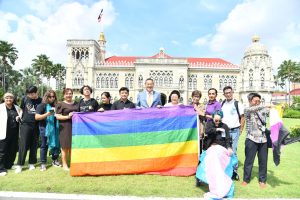Thailand is set to become the first Southeast Asian nation to legalize same-sex marriage after the country’s House of Representatives overwhelmingly approved a marriage equality bill yesterday. The legislation was passed by 400 of the 415 lawmakers present, with only 10 voting against it, according to Reuters.
The decade-long Thai campaign for same-sex marriage has now surmounted its most significant hurdle. While the law still requires approval from the Senate and endorsement from the king before it becomes law, the bill had the support of all of Thailand’s major parties and its passage is expected to proceed as a matter of course.
The law will then come into force 120 days after the king’s sign-off, at which point the nation will officially become the third nation in Asia to legalize same-sex marriage, after Nepal and Taiwan.
“We did this for all Thai people to reduce disparity in society and start creating equality,” Danuphorn Punnakanta, chairman of the parliamentary committee on the draft bill, told lawmakers ahead of the reading. “I want to invite you all to make history.”
The bill passed yesterday was an amalgamated version of four different draft laws that the House of Representatives approved in December, including one proposed by Prime Minister Srettha Thavisin’s government. A special parliamentary committee was then established to combine these various proposed laws into a definitive Marriage Equality Bill.
The bill will amend 68 provisions of the country’s Civil and Commercial Code to change the composition of a marriage, from “a man and a woman” to “two individuals.” It will also change their official legal status from “husband and wife” to “married couple.” The changes will grant LGBTQ couples inheritance and adoption rights equal to those in heterosexual marriages.
The legal recognition of same-sex marriage was a campaign promise of Srettha’s Pheu Thai Party ahead of last year’s general election. It also enjoyed the backing of the progressive Move Forward Party, which won last year’s general election but was blocked from forming government by the military-appointed Senate.
After passing the law yesterday, Srettha acclaimed its passage and pointed to Pheu Thai’s long support for marriage equality. The passage of the law “is considered the pride of Thai society, that together walk towards a society of equality and respect,” he wrote in a post on X (formerly Twitter). Srettha has also voiced support for Bangkok’s bid to host World Pride in 2028.
The passage of the law is a significant step in harmonizing Thailand’s legal framework with its reputation as one of Asia’s most liberal countries, and a relative haven country for LGBTQ people. Even though recent public opinion polls show that marriage equality enjoys strong public support, the progress toward a marriage equality law has been slow and generally not been a priority of the military and military-backed governments that ruled the country from 2014 until last year.
Srettha’s predecessor Prayut Chan-o-cha proposed a Civil Partnership Bill that would have permitted same-sex couples the right to adopt children, jointly manage assets and liabilities, and inherit properties, but fell short of full legalization of marriage. Lawmakers debated the bill last year but did not come to a final vote before the election in May. In some ways, it was a positive thing, as it allowed the new Pheu Thai government to draft new legislation that went much further than the civil union law.
In an emailed statement, Mookdapa Yangyuenpradorn of the advocacy group Fortify Rights said that the passage of the law was “cause for celebration,” even though the law was “not totally satisfactory” in its current state.
In particular, LGBTQ rights advocates pushed – unsuccessfully, in the end – for the terms “father” and “mother” to be changed to the gender-neutral “parent” in references to the family unit. This was to ensure that same-sex couples would not face hurdles in issues like adoption.
“It is important to ensure that the more inclusive and gender-neutral language ‘parents’ is included in future revisions to prevent any discriminatory application of the Civil and Commercial Code,” she said.

































